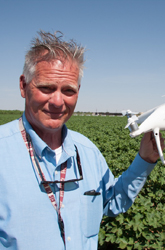 Paxton Payton is a Plant Physiologist at the Cropping Systems Research Laboratory in Lubbock, Texas. He has degrees in Biology from The University of Texas at Austin and Texas Tech University. His research is focused on molecular and physiological responses to water and temperature stress.
Paxton Payton is a Plant Physiologist at the Cropping Systems Research Laboratory in Lubbock, Texas. He has degrees in Biology from The University of Texas at Austin and Texas Tech University. His research is focused on molecular and physiological responses to water and temperature stress.
 James Mahan has been a plant physiologist with the USDA-ARS in Lubbock TX for 30+ years. He has degrees from Southwestern Oklahoma State University and Texas A&M University. His research is focused on the response of plants to water and temperature stresses. Current research interests include irrigation management, rainfed cotton production and the obligatory Big Data.
James Mahan has been a plant physiologist with the USDA-ARS in Lubbock TX for 30+ years. He has degrees from Southwestern Oklahoma State University and Texas A&M University. His research is focused on the response of plants to water and temperature stresses. Current research interests include irrigation management, rainfed cotton production and the obligatory Big Data.
